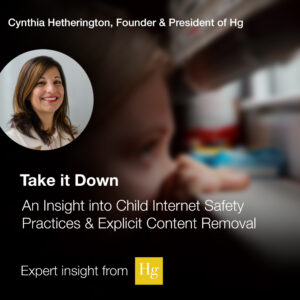 Cynthia Hetherington, founder and President of Hetherington Group (Hg), serves on the Raven Board of Advisors as a subject matter expert in open source intelligence (OSINT) and cyber investigations. In her commitment to Raven’s mission to transform the United States’ response to child exploitation, Hg is issuing a series of public service blogs.
Cynthia Hetherington, founder and President of Hetherington Group (Hg), serves on the Raven Board of Advisors as a subject matter expert in open source intelligence (OSINT) and cyber investigations. In her commitment to Raven’s mission to transform the United States’ response to child exploitation, Hg is issuing a series of public service blogs.
Cynthia Hetherington was present as Raven CEO John Pizzuro testified before the United States Senate Committee on the Judiciary hearing entitled “Protecting Our Children Online.” Mr. Pizzuro gave his testimony alongside a panel of experts, parents and students imploring our elected officials to implement stricter policies to protect our children. Many of the speakers criticized BigTech’s refusal to voluntarily adopt protocols that would shield our youth from online predators.
“As a result of the exponential increase in Cybertips (these tips increased by 2,800% between 2012 and 2021) law enforcement agencies have been forced to become reactive, and most can no longer engage in the proactive operations that are designed to target the most dangerous offenders,” Mr. Pizzuro stated.
Fortunately, an initiative entitled “Take It Down,” has recently been established to assist with reactive measures users can employ themselves. With the help of funding from Meta, The National Center for Missing & Exploited Children created a tool to help combat child sexual exploitation and enable youth the ability to remove their own sexually explicit images from the internet. “This is an important step in the right direction for BigTech to mitigate systemic cyber risks to our children,” Ms. Hetherington stated. “Hg has been and will continue to be committed to supporting the efforts of law enforcement, government agencies, and organizations working to end child exploitation,” she continued.
From their website: “Take It Down is a free service that can help you remove or stop the online sharing of nude, partially nude, or sexually explicit images or videos taken of you when you were under 18 years old. You can remain anonymous while using the service and you won’t have to send your images or videos to anyone. Take It Down will work on public or unencrypted online platforms that have agreed to participate.”
“Take It Down works by assigning a unique digital fingerprint, called a hash value, to specific images or videos. When tech platforms sign up to participate, they are provided these hash values so they can detect and remove the imagery on their public or unencrypted sites and apps. This all happens without the image or video ever leaving a device or anyone viewing it.”
The person reporting the information can remain anonymous; only the hash value will be provided to NCMEC.
Current participating platforms, all of which have notably faced criticism for neglecting to protect minors from sexual exploitation, include Meta (Facebook & Instagram), MG Freesites (Pornhub, Mindgeek), OnlyFans, and Yubo.
FBI’s Tips to Help Protect Children
Children’s increased online presence may put them at greater risk of child exploitation. Parents, guardians, caregivers, and teachers can take the following measures to help protect children from becoming victims of online child predators:
- Discuss internet safety and develop an online safety plan with children before they engage in online activity. Establish clear guidelines, teach children to spot red flags, and encourage children to have open communication with you.
- Supervise young children’s use of the internet, including periodically checking their profiles and posts. Keep electronic devices in open, common areas of the home and consider setting time limits for their use.
- Review games, apps, and social media sites before they are downloaded or used by children. Pay particular attention to apps and sites that feature end-to-end encryption, direct messaging, video chats, file uploads, and user anonymity, which are frequently relied upon by online child predators.
- Adjust privacy settings and use parental controls for online games, apps, social medial sites, and electronic devices.
- Tell children to avoid sharing personal information, photos, and videos online in public forums or with people they do not know in real life. Explain to your children that images posted online will be permanently on the internet.
- Teach children about body safety and boundaries, including the importance of saying ‘no’ to inappropriate requests both in the physical world and the virtual world.
- Be alert to potential signs of abuse, including changes in children’s use of electronic devices, attempts to conceal online activity, withdrawn behavior, angry outbursts, anxiety, and depression.
- Encourage children to tell a parent, guardian, or other trusted adult if anyone asks them to engage in sexual activity or other inappropriate behavior.
Immediately report suspected online enticement or sexual exploitation of a child by calling 911, contacting the FBI at tips.fbi.gov, or filing a report with the National Center for Missing & Exploited Children (NCMEC) at 1-800-843-5678 or report.cybertip.org. To have a known image removed, utilize NCMEC’s free Take It Down service by visiting https://takeitdown.ncmec.org/
Download Hg’s free FactSheet, What the App?! Top Social Media APPS and the Lowdown on What Info They Collect, and learn how to protect children’s privacy on a variety of popular apps.



